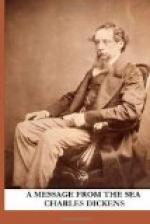“Let me carry your baggage, Captain Jorgan; I can easily take it with mine.”
“Thank’ee,” said the captain. “I’ll carry it myself. It’s only a comb.”
They climbed out of the village, and paused among the trees and fern on the summit of the hill above, to take breath, and to look down at the beautiful sea. Suddenly the captain gave his leg a resounding slap, and cried, “Never knew such a right thing in all my life!”—and ran away.
The cause of this abrupt retirement on the part of the captain was little Kitty among the trees. The captain went out of sight and waited, and kept out of sight and waited, until it occurred to him to beguile the time with another cigar. He lighted it, and smoked it out, and still he was out of sight and waiting. He stole within sight at last, and saw the lovers, with their arms entwined and their bent heads touching, moving slowly among the trees. It was the golden time of the afternoon then, and the captain said to himself, “Golden sun, golden sea, golden sails, golden leaves, golden love, golden youth,—a golden state of things altogether!”
Nevertheless the captain found it necessary to hail his young companion before going out of sight again. In a few moments more he came up and they began their journey.
“That still young woman with the fatherless child,” said Captain Jorgan, as they fell into step, “didn’t throw her words away; but good honest words are never thrown away. And now that I am conveying you off from that tender little thing that loves, and relies, and hopes, I feel just as if I was the snarling crittur in the picters, with the tight legs, the long nose, and the feather in his cap, the tips of whose moustaches get up nearer to his eyes the wickeder he gets.”
The young fisherman knew nothing of Mephistopheles; but he smiled when the captain stopped to double himself up and slap his leg, and they went along in right goodfellowship.
CHAPTER V {1}—THE RESTITUTION
Captain Jorgan, up and out betimes, had put the whole village of Lanrean under an amicable cross-examination, and was returning to the King Arthur’s Arms to breakfast, none the wiser for his trouble, when he beheld the young fisherman advancing to meet him, accompanied by a stranger. A glance at this stranger assured the captain that he could be no other than the Seafaring Man; and the captain was about to hail him as a fellow-craftsman, when the two stood still and silent before the captain, and the captain stood still, silent, and wondering before them.
“Why, what’s this?” cried the captain, when at last he broke the silence. “You two are alike. You two are much alike. What’s this?”
Not a word was answered on the other side, until after the seafaring brother had got hold of the captain’s right hand, and the fisherman brother had got hold of the captain’s left hand; and if ever the captain had had his fill of hand-shaking, from his birth to that hour, he had it then. And presently up and spoke the two brothers, one at a time, two at a time, two dozen at a time for the bewilderment into which they plunged the captain, until he gradually had Hugh Raybrock’s deliverance made clear to him, and also unravelled the fact that the person referred to in the half-obliterated paper was Tregarthen himself.




